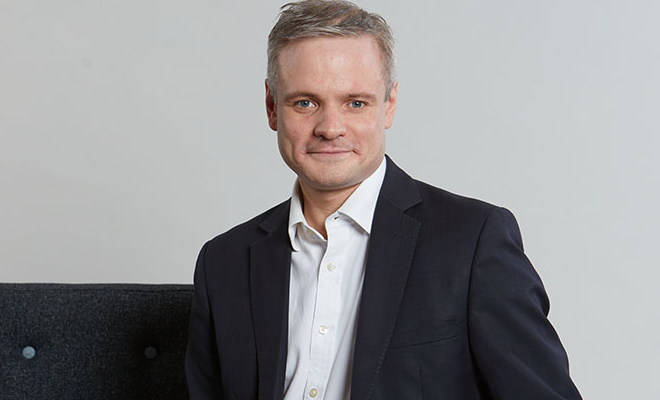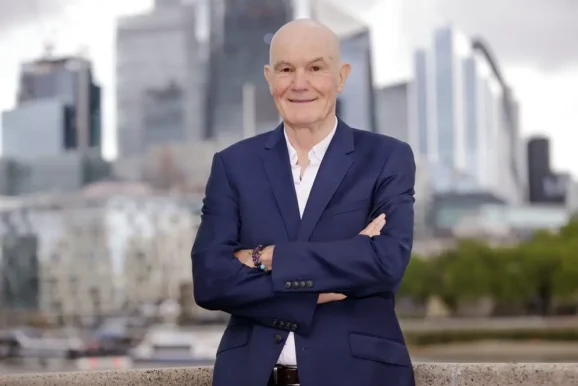Trading Places: An Exclusive Q&A With Chris Beauchamp of IG

Dr Stephen Simpson
- Published
- Home, Opinion & Analysis

The winning day trader is logical, focused, and cool under pressure. But the fast-paced nature of the markets can create intense pressure, and learning to deal with strong emotions isn’t always easy. Here, elite mind coach Dr Stephen Simpson interviews Chris Beauchamp, the Chief Market Analyst at IG, about trading psychology and the strategies he uses to stay steady and make smarter, emotion-free decisions
Dr. Stephen Simpson (Q): Compared to technical analysis and market knowledge, how vital are psychological factors in successful trading?
Chris Beauchamp (A):When people start out, they need to grasp the importance of psychology. Their initial focus is reading many books, picking the markets, learning about technical analysis, understanding charts and indicators, and reading company reports. This is important as part of the experience of learning about trading and markets and how they work.
The psychological side and risk management are the two things that go hand in hand. You can read all the trading rules, learn about all the indicators, and have as many charts as you like, but if you don’t grasp the critical element of risk management and make sure you’re in the right mindset with trading, the results are often disappointing.
What’s interesting about our data is that when we examine many of our key markets, we find more winning than losing trades. However, when you look at the average gain and loss on each trade, the losses are usually more significant.
IG clients are good at telling whether the markets are moving up or down, but risk management gets them. Crucially, they allow their losing trades to run too long and cut their winners too early, significantly hindering their chances of making money in trading and investing.
(Q): The first thing I saw on your website and platform is that 68% of retail investors lose money. What are the key characteristics of the 32% of people who make money?
(A): The most important thing is to manage your losses. When you’re placing your trade, I tell clients that it’s a bit like a scientific hypothesis. If I think this will happen, where is the line that invalidates my hypothesis? That’s where I put my ‘stop’.
The problem is that many people do it the wrong way around. They work out how much they want to make on a trade rather than working out where their ‘stop’ should go based on their risk.
The other problem is that people tend to have specific, fixed approaches to trading. They always risk the same amount on every trade regardless of how volatile or quiet the market is, and they don’t consider prevailing market conditions.
Another problem is that they often trade without a ‘stop’. If the market starts to fall and they hold that trade, the loss gets bigger and bigger. Eventually, they concede defeat and close the trade for a much more significant loss than they should have.
It only takes a few significant losses to wipe out any gains you’ve made, and then you start eating into your trading capital.
We emphasise to clients when they’re attending our events and webinars that you can control how much you risk on a trade. Essentially, that’s all you have control over. The market might move in your favour in an hour, and it might move in your favour in two or three weeks. You don’t have any control over that.
You control where your ‘stop’ goes and how much you’re prepared to lose. You define your risk before you start; don’t think about it after you place the trade because, by then, it’s too late.
(Q): How does fear of missing out (FOMO) affect trading decisions, and how can traders mitigate its influence?
(A): It’s very significant because IG has so many markets. Human nature being what it is, people get bored and wander around from market to market. They notice a particular market has had a big move and open a trade. They are coming late to the party, and it’s due to their fear of missing out.
Human nature is what it is. You will always have that little voice in your head that tells you to trade and see what happens. People chase markets, and they rush in after big moves because they want to participate.
Conversely, when a market drops, they could miss the chance of catching a rising market.
(Q): Is there any advantage in ignoring herd mentality and FOMO and becoming a maverick investor?
(A): I’ve heard professional fund managers say, ‘But we still like this stock even though it is going down, and we continue to like it.’ When it’s gone down 50% ‘We like it even more because it’s cheaper.’
Yes, it is, but the market is telling you something here, so we wouldn’t say blindly go against the herd.
(Q): How valuable are the client sentiment percentage ratings associated with each trade?
(A): These numbers are the percentage of investors buying or selling in the last hour, today, this week, this month, and longer. This goes back to the earlier point about people being quite good at telling whether to go long or short as a group.
The problem is that sometimes people close their winners too early, and the flip side is that they often hold on to their losers too long.
This applies to both the industry and investors. For example, consider all the stories about people who bought Amazon decades ago and didn’t hold onto it.
(Q): How valuable are the signals associated with each trade?
(A): The signals are from external providers, and we provide them because people like systems that give them trade ideas. We provide many signals, but clients are often tempted to trade in too many markets.
We also have the trade analysis tool and trade analytics. These tools examine your trading and show you which markets you were more successful in. They also show your bad trades, which helps people keep a trading journal.
We always stress to clients that they should keep a list of their trades, examine why they made them, calculate their profit or loss, and try to identify a reason for each trade so that they can look back and see where they did well and poorly.
(Q): How does confirmation bias influence trading decisions, and how can traders maintain objectivity?
(A): People are very good at seeing what they want to see, whether in life or in trading. When you look at charts, you’re always looking back in time, and it’s obvious what you should have done.
The problem is that people will always look for data to support their views. I call this the undergraduate essay method. Students generate ideas and then seek evidence to support them.
Some financial media people get on live TV by being more bearish because it’s more interesting to say, ‘This market is overvalued’ rather than go on air saying it will probably go up next month because it usually does, but that’s not very interesting.
People will seek reasons to support their argument in whatever market they’re trading in. Everyone wants to call the turn in markets, whether it’s the top or the bottom, because that’s in their view where the excitement is.
Confirmation bias is massive, and it’s too easy for people to fall prey to it. In trading, you discard the news you don’t want. Instead, you look for the news and the price action that reinforces your view.
(Q): Athletes often talk about being “in the zone.” This is the optimum mindset for peak performance. Does this also apply to traders?
(A): I’m a musician in my spare time, and you have days where it’s easy and some days, it’s just like pulling teeth. It’s so painful.
The same thing applies to trading. You have times when it goes really well, the market moves in your favour, and you feel like you could do this all the time.
Other times, you will experience a row of losses. We stress to our clients it doesn’t matter what strategy you choose if you have a plan. But also understand that no plan works all the time.
It can be intensely frustrating because you can have solid periods and weak periods, and the critical difference between the successful and unsuccessful ones is knowing how to take those runs and losses and not resort to ‘revenge trades’.
(Q): Is there any room for intuition in trading?
(A): Yes, there is. When you recognise things you’ve seen before, whether it’s in price action or in fundamental analysis, you can use intuition to an extent, but it has to be used carefully.
You must manage your risk and understand your alternative and what happens if it doesn’t work out.
You will recognise trends over time, and hopefully, then you can apply that in the future and develop a sense of ‘this might be happening.’
The key is always to say, ‘I don’t know for certain; nobody knows for certain, but it might be doing something similar to what it’s done before.’
(Q): What advice do you give to clients who are on a losing trend, losing their confidence, and making poor decisions?
(A): We can examine lessons that apply to sports, music, training, or gambling. One is knowing when to step away. This means stepping away, reassessing your strategy, and returning to your rules. Consider why you were trading in the first place, examine your recent run, and try to find when it has worked, as well as taking a break.
The mindset is crucial. The combative mindset is probably the worst because it involves competing against the market.
If you’re in the market, it doesn’t care about you or anybody else. It’s just the aggregate of many buyers and sellers across the globe who are trading for different reasons or different time frames, and you’re just a tiny part of it.
(Q): Are there any behind-the-scenes things that your company can do to detect early warning signs that someone is getting in deeper than they should?
(A): IG Group provides various tools to help clients manage their trading activity. For larger clients, we offer direct monitoring and support. We also hold risk management sessions and offer a ‘self-exclusion’ option for those who need to step away.
Our trade analytics tool is particularly helpful. It analyses trading patterns and provides feedback, encouraging responsible trading habits. We prioritise client longevity over short-term gains and encourage clients to discuss their trading activity with their account managers.
(Q): The problem is that if their emotions still rule them, they will continue to make the same mistakes. Do you have any views about this?
(A): It’s tricky. We can only actively change their behaviour if they choose to do so themselves. Unfortunately, this requires a degree of self-awareness that some people sometimes lack.
(Q): Does IG Group plan to expand its trader psychology and well-being offerings?
(A): Yes, we’re always looking to expand. However, our resources are limited. We only have a couple of analysts in most offices, and we’re at capacity with the people who do this kind of thing, so it’s hard to increase output. However, we always want to discuss it further.
For example, we’re conducting webinars as part of our training plans. They are a six-week series that covers risk management, planning, combating FOMO, and standard features. We run them every other month to provide background and allow people to access these resources. There are plenty of other resources out there as well.
Trading psychology has become a much bigger topic over the last 10 years. More people are aware of it now and have access to information about it.

Dr. Stephen Simpson is an internationally acclaimed mind coach, TV and radio presenter, hypnotherapist, TEDx speaker, bestselling author, business consultant, and Fellow of the Royal Society of Medicine. With nearly 40 years as a practising physician and extensive experience in elite performance coaching, mental health, hypnosis, and NLP, he has worked with top athletes on the PGA European Golf and World Poker Tours. Dr. Simpson holds an MBA from Brunel University and has served as Regional Medical Director for Chevron, contributing to global health initiatives with leaders like Bill Clinton and Bill Gates. He hosts popular shows such as “Zen and the Art of NLP,” and his YouTube channel boasts over 260 videos and 350,000 views. His latest book, “The Psychoic Revolution,” encapsulates his innovative methods for achieving peak performance.
RECENT ARTICLES
-
 Europe cannot call itself ‘equal’ while disabled citizens are still fighting for access
Europe cannot call itself ‘equal’ while disabled citizens are still fighting for access -
 Is Europe regulating the future or forgetting to build it? The hidden flaw in digital sovereignty
Is Europe regulating the future or forgetting to build it? The hidden flaw in digital sovereignty -
 The era of easy markets is ending — here are the risks investors can no longer ignore
The era of easy markets is ending — here are the risks investors can no longer ignore -
 Is testosterone the new performance hack for executives?
Is testosterone the new performance hack for executives? -
 Can we regulate reality? AI, sovereignty and the battle over what counts as real
Can we regulate reality? AI, sovereignty and the battle over what counts as real -
 NATO gears up for conflict as transatlantic strains grow
NATO gears up for conflict as transatlantic strains grow -
 Facial recognition is leaving the US border — and we should be concerned
Facial recognition is leaving the US border — and we should be concerned -
 Wheelchair design is stuck in the past — and disabled people are paying the price
Wheelchair design is stuck in the past — and disabled people are paying the price -
 Why Europe still needs America
Why Europe still needs America -
 Why Europe’s finance apps must start borrowing from each other’s playbooks
Why Europe’s finance apps must start borrowing from each other’s playbooks -
 Why universities must set clear rules for AI use before trust in academia erodes
Why universities must set clear rules for AI use before trust in academia erodes -
 The lucky leader: six lessons on why fortune favours some and fails others
The lucky leader: six lessons on why fortune favours some and fails others -
 Reckon AI has cracked thinking? Think again
Reckon AI has cracked thinking? Think again -
 The new 10 year National Cancer Plan: fewer measures, more heart?
The new 10 year National Cancer Plan: fewer measures, more heart? -
 The Reese Witherspoon effect: how celebrity book clubs are rewriting the rules of publishing
The Reese Witherspoon effect: how celebrity book clubs are rewriting the rules of publishing -
 The legality of tax planning in an age of moral outrage
The legality of tax planning in an age of moral outrage -
 The limits of good intentions in public policy
The limits of good intentions in public policy -
 Are favouritism and fear holding back Germany’s rearmament?
Are favouritism and fear holding back Germany’s rearmament? -
 What bestseller lists really tell us — and why they shouldn’t be the only measure of a book’s worth
What bestseller lists really tell us — and why they shouldn’t be the only measure of a book’s worth -
 Why mere survival is no longer enough for children with brain tumours
Why mere survival is no longer enough for children with brain tumours -
 What Germany’s Energiewende teaches Europe about power, risk and reality
What Germany’s Energiewende teaches Europe about power, risk and reality -
 What the Monroe Doctrine actually said — and why Trump is invoking it now
What the Monroe Doctrine actually said — and why Trump is invoking it now -
 Love with responsibility: rethinking supply chains this Valentine’s Day
Love with responsibility: rethinking supply chains this Valentine’s Day -
 Why the India–EU trade deal matters far beyond diplomacy
Why the India–EU trade deal matters far beyond diplomacy -
 Why the countryside is far safer than we think - and why apex predators belong in it
Why the countryside is far safer than we think - and why apex predators belong in it


























